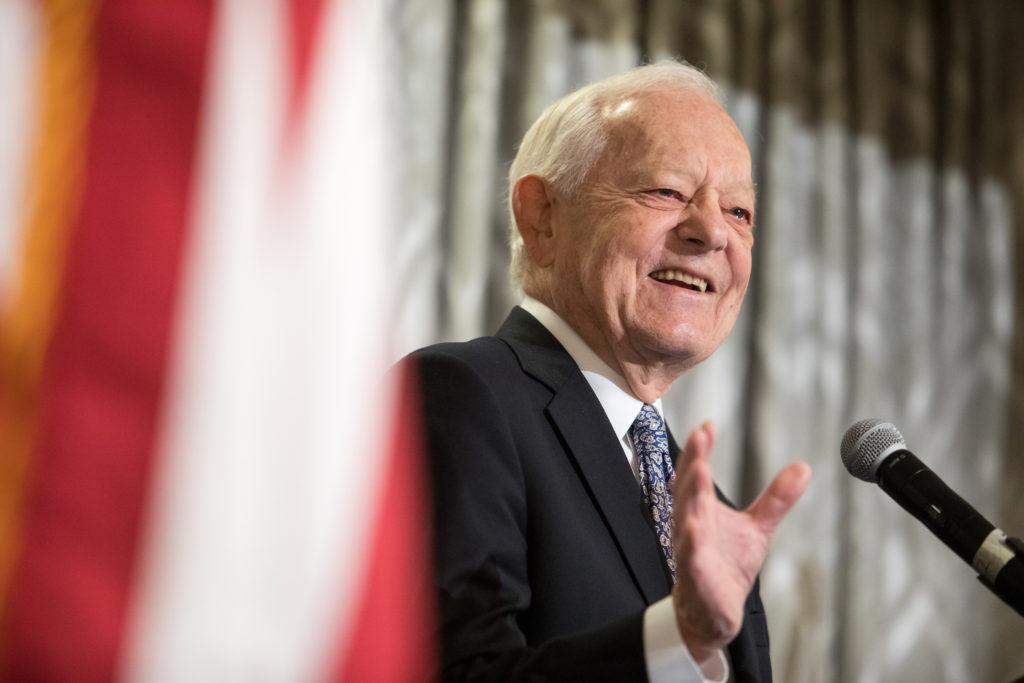
Legendary Journalist Bob Schieffer addressing USSYP delegates during Washington Week 2017.
The fourth estate, as the free press is also known, is a term recognizing the critical role of trained and ethical journalists as watchdogs of the public interest in a functioning democracy. America’s founders knew the integral role of the press as a check and balance on power at the outset of the nation. Journalists play a key part in the United States Senate Youth Program’s Washington Week as well, with a senior member of the national media serving as a speaker each year. As veteran CBS News anchor Bob Schieffer explained, “When the Founders wrote the Constitution and the Declaration of Independence, they saw the press as absolutely as important and as much a part of our political process as their ingenious plan of dividing power into three separate branches of government.”
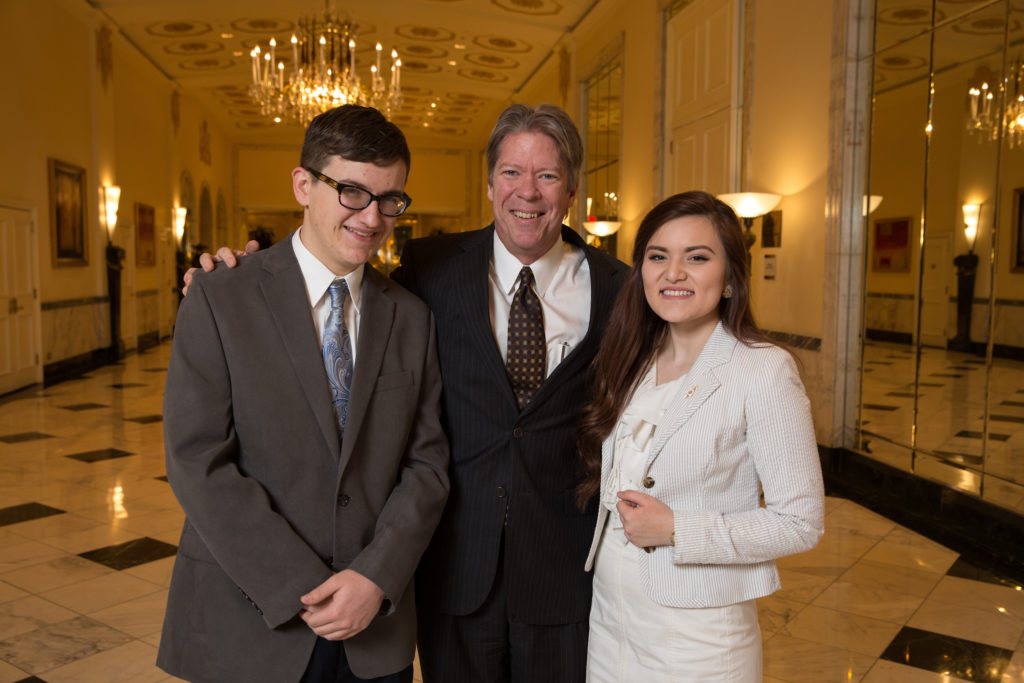
CBS News Chief White House Correspondent Major Garrett with USSYP 2015 Missouri delegates Cameron Leahy and Saniya Ablatt.
In 2015, Missouri delegates were given the opportunity to welcome one of their home state stars. CBS News Chief White House Correspondent Major Garrett, a graduate of the University of Missouri’s School of Journalism, who showed a deep understanding of print and broadcast news coverage and an equally incisive understanding of the lives of high school students about to enter college.
He offered delegates a balanced perspective on their looming college admissions decisions, “Take this moment with a calmer heart,” the father of three similarly-aged children at the time, intoned, “it will all work out and you will find your niche in the college you choose.” He continued with encouragement and valuable life lessons using his own career as illustration. At their age, he reminisced, he had his life plan all worked out. He buckled down and graduated with a double major in journalism and political science in record time. He had “checked all the right boxes” and thought he was set. Then came the 67 rejection letters from newspapers across the United States. He was the only one in his journalism class to graduate without a job. Setbacks like this “Are upsetting. They jar you, but they are not fatal. You can rebound. You can bounce back.” Finally, an offer came from the Amarillo Globe-News for $250 a week to be the crime reporter. He jumped at the chance and used the position as a stepping stone to a journalistic career that has included posts at U.S. News and World Report, The Washington Times, CNN, Fox News, and now CBS.
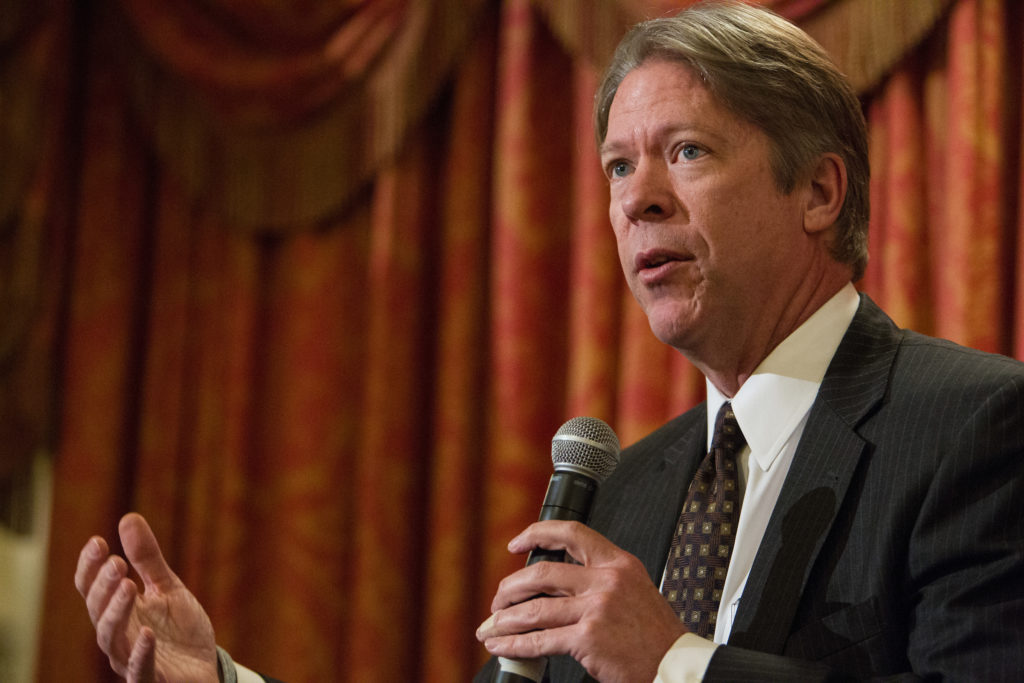
Major Garrett addresses the USSYP delegates.
Summing up a typical day as a high-profile reporter proved difficult; one of the things he loves about his work is that “There is no such thing as a typical day.” “You have to be ready for anything,” he said, adding that every White House reporter should have at the tip of his or her tongue five relevant questions they would ask the president if he suddenly announced a press conference. He credits the trajectory of his career with two key principles: first, be willing to adapt. “If you think about yourself as one thing and one thing only, you’re limiting yourself. Always be willing to adapt. Always be willing to change. Always be willing to look slightly over the horizon at what you think may be coming at you.” Second, he said, a pitfall of the electronic age is speed and inaccuracy. “As you gather information, make sure you are making all efforts to verify it. First and wrong is utterly useless.”
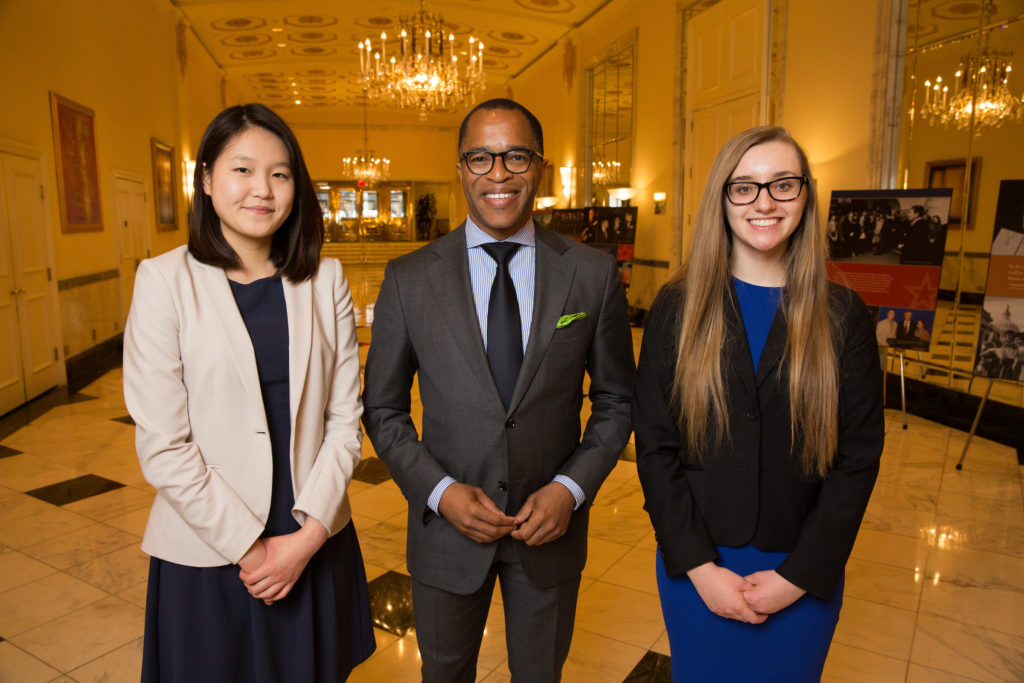
Washington Post opinion writer Jonathan Capehart with USSYP 2016 Minnesota delegates Dasom Ham and Grace Greason
In 2016, Washington Post opinion writer Jonathan Capehart knew he was looking out at an audience of super-intelligent digital age news junkies, so he dove right in. “I want to talk about the democratization of information,” he began, “This has been an amazing time! 15 – 20 years ago the major news producers in New York and Washington, along with a handful of strong regional newspapers, would determine what was news. Enter ‘the internet’ and all of that has changed,” he smiled. “Now you have as much access and information as I do as a journalist, but there’s a responsibility on you, as a news consumer, to make sure that you are effectively synthesizing and using that information.” Having previously served as the youngest member of the New York Daily News editorial board which won a Pulitzer Prize during his tenure, and currently appearing as a regular political commentator on MSNBC, Mr. Capehart was at the epicenter of political debate and slicing commentary during the maelstrom of the 2016 presidential primary campaign and the 2018 mid-term elections. He cautioned the delegates to not allow the delivery of information to preclude their deeper understanding of the issues. “Especially on Twitter, people tend to just read the headline and not click the link,” he lamented. “If I wrote the way most people read I’d be fired! Read the pieces. Read them with comprehension. Look for the nuances. We writers, we’re not just throwing things up on a screen; every word, every sentence is considered, so just remember, read before you Tweet!”
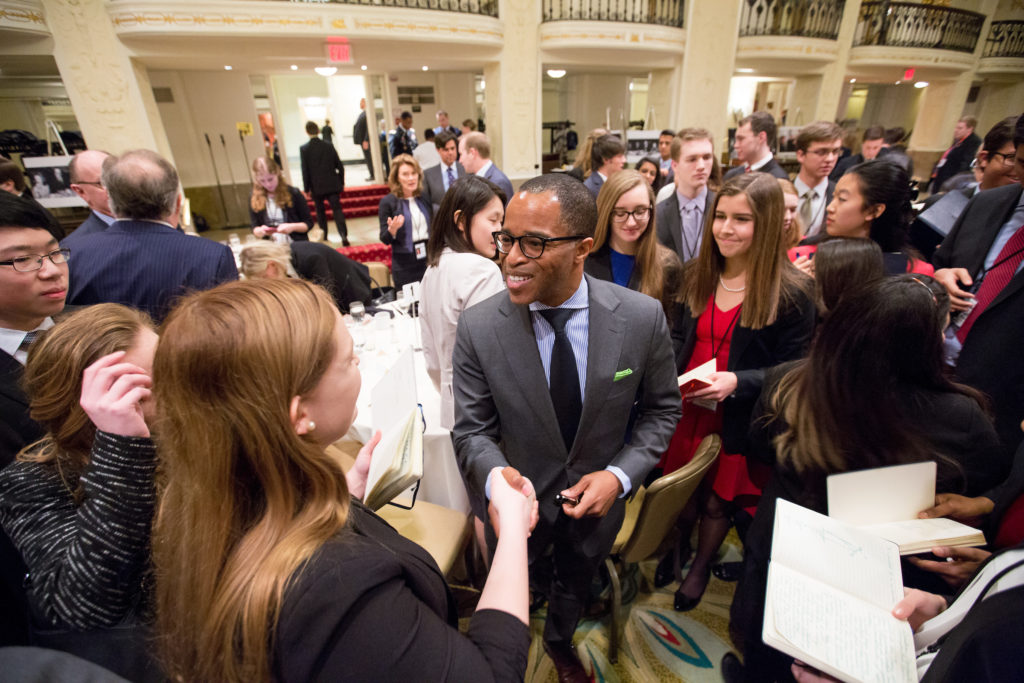
Jonathan Capehart meets with USSYP delegates following his address.
Mr. Capehart relayed his personal story of knowing from a very early age that he wanted to be a journalist. Through a serendipitous route, he made it as a high school junior into the NBC Nightly News office in New York early one morning, and summoned the courage to strike up a conversation with the one person he saw at a desk. That moment led to the internship that began his professional path. “There are several lessons in that story,” he said, “One, have a dream. Have this overarching dream that you could not possibly think could come true, and it can come true. The second thing is be mindful of guardian angels. Some of them you can see, and you know who they are, but there are a lot of guardian angels out there who exert influence over your life without you ever knowing that they’re there.”
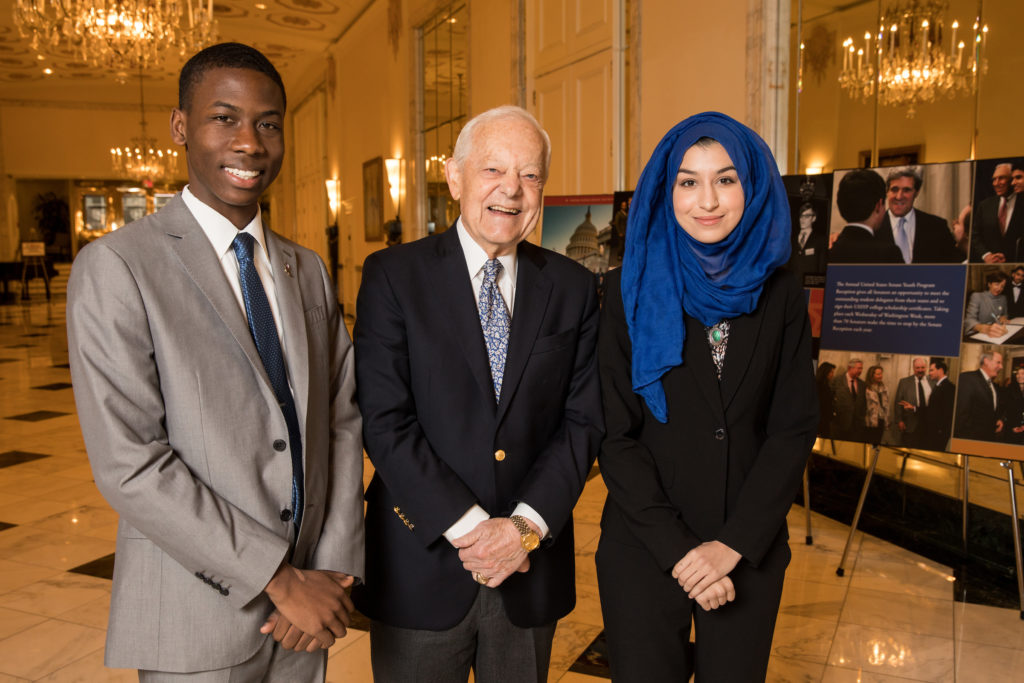
Bob Schieffer with USSYP 2017 Texas delegates Ricky Allen Cooks Jr. and Amina Mabizari
The USSYP Class of 2017 had the great fortune to hear from an eyewitness to history, and one of the most respected journalistic minds in America, Bob Schieffer. Whether delegates and their families knew him from the CBS Evening News, or joined him on Sunday mornings with Face The Nation, Bob Schieffer has been a part of the American political dialogue for more than 50 years. Warmly welcomed by his home state Texas delegates, Mr. Schieffer spoke of working today with colleagues not much older than the delegates themselves. “I may be more hip than some of you might suspect,” he said jovially.
The world of journalism has transformed since he was an overnight crime reporter for a college radio station, at the pay of $1 an hour. But some principles are set in stone. “The most important thing we can do,” he said, describing his beloved profession, “is get it right. There is nothing that hurts our credibility more than getting it wrong.” He was drawn to journalism to seek the truth and give things a second look. “Our responsibility is to ask questions,” he affirmed.
A member of what is characterized as ‘the greatest generation,’ Mr. Schieffer closed his remarks with a plea for the next generation. “We have got to get our young people to understand how important public affairs are, whether it’s journalism, or even better – I wish every person in this room would run for office. I don’t care if you are Democrat, Republican, Vegetarian, or something in between. We need bright, young, smart, courageous people to get interested in our political system again.”
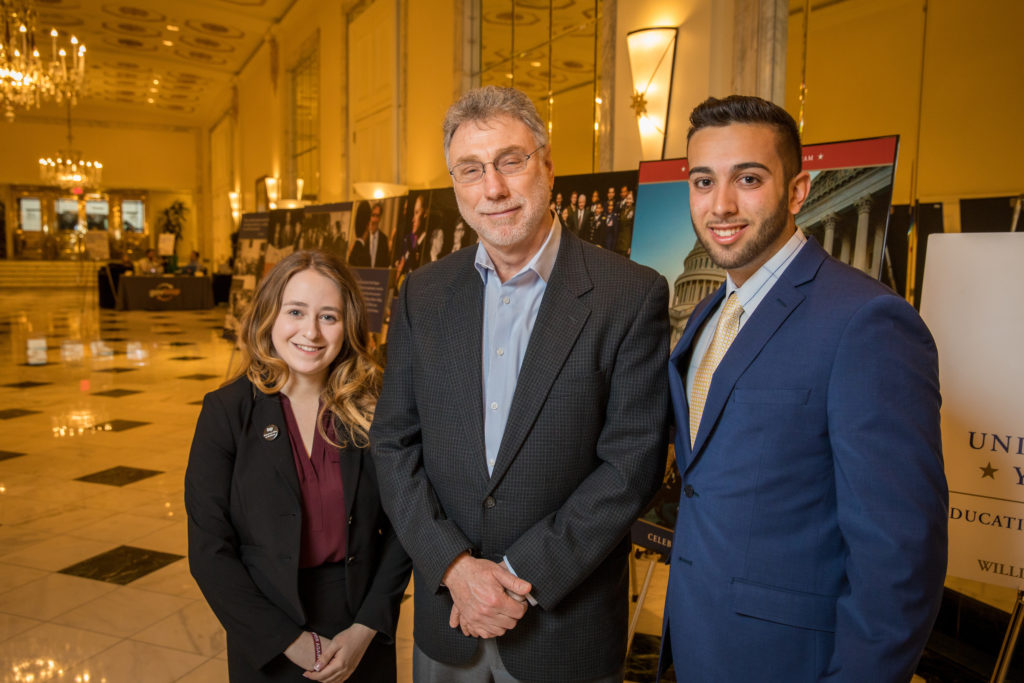
Executive Editor of The Washington Post Martin Baron with USSYP 2017 Florida delegates Carlee Goldberg and Stephen Marante
The soft-spoken demeanor of Martin Baron, Executive Editor of The Washington Post belied the steely tenacity and ferocity of purpose that have led to his many accomplishments as one of America’s most critically acclaimed national newspaper editors. During Washington Week 2018, he reiterated the freedoms of the First Amendment to the Constitution, explaining the principles that guide his work each day, “When James Madison wrote that amendment he talked about examining public characters and measures, and that is how we think about our role,” he said, “not just The Washington Post, but all press has the responsibility to examine our public figures, our government figures, our politicians, their policies, and all powerful institutions and individuals who have a dramatic impact on our society.”
Mr. Baron gave an account of three famous stories he was responsible for covering, beginning with the 2000 presidential election and the decision he made as editor of the Miami Herald to engage a private accounting firm to re-count the unresolved Florida votes after the Supreme Court had voted to stay that effort. “In the end we came up with the fact that George W. Bush had almost certainly won those votes in Florida. I think it was a surprise to many Democrats. But contrary to the accusations that had been leveled against us by the Republican Party, we had no intention of de-legitimizing the presidency of George W. Bush. Our only intention was to find out who really won the election,” he said, adding, “It is the presidency of the United States, after all.”

His experience at The Boston Globe, heading an explosive investigative report into sexual abuse cases by the Catholic Church in Boston earned the Pulitzer Prize. “We had evidence of potential severe wrongdoing by a very powerful institution and a very powerful individual, and we have an obligation, as the press, to investigate that,” he said, noting the impact of the more than 900 stories that resulted in the resignation of a Cardinal and a series of reforms.
Regarding the current administration, Mr. Baron’s work is ongoing. “Mr. Trump has made the media a constant target, even calling us ‘the enemy of the people,’’’ he said. “Our job is to hold any administration accountable, to investigate any wrongdoing that we see and to publish the results of those investigations. Those kinds of investigations are inevitably perceived through a partisan lens, as the Pentagon Papers and as Watergate were perceived, and that’s not what’s happening. What’s happening is that we’re trying to fulfill our obligations to examine public characters and measures, to give meaning to the First Amendment.”
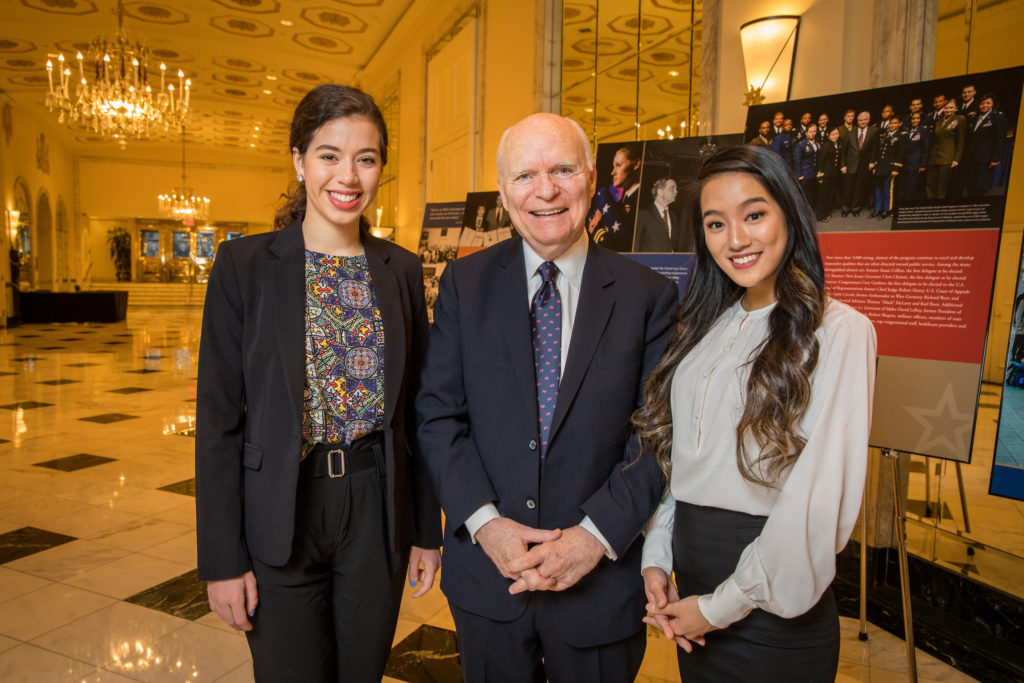
C-SPAN Founder Brian Lamb with USSYP 2018 Arizona delegates Vanessa Strait-Constandse and Kaitlyn Yoo
No week with a focus on public policy could be complete without C-SPAN founder Brian Lamb, who has been a part of Washington Week’s closing day for ten years, orchestrating a town hall meeting which delegates can watch with friends and family as they return home. Delegates share their passion with Mr. Lamb: “The first moment I realized I was into public service and wanted to follow politics was the night Senator Chris Murphy hosted his filibuster in the Senate Floor. I stayed up until 3:00 AM watching on C-SPAN,” explained 2018 Tennessee delegate Ben Frigon, evoking a broad smile from Mr. Lamb. Arizona delegate Vanessa Constandse summed up her fellow students’ gratitude in her closing remarks, “It is through his efforts that many students have cultivated their first understandings of government processes through clear, nonpartisan reporting. Mr. Lamb and C-SPAN have brought the energy of D.C. into our cities, our classrooms, our homes, and have worked steadfastly to ensure the constant access of the people to their government.”
The United States Senate Youth Program is honored to be the recipient of the generosity of America’s journalistic leaders. Their wisdom is cherished and their personal manifestation of the importance a free press in a participatory democracy makes an indelible impact on each audience member.
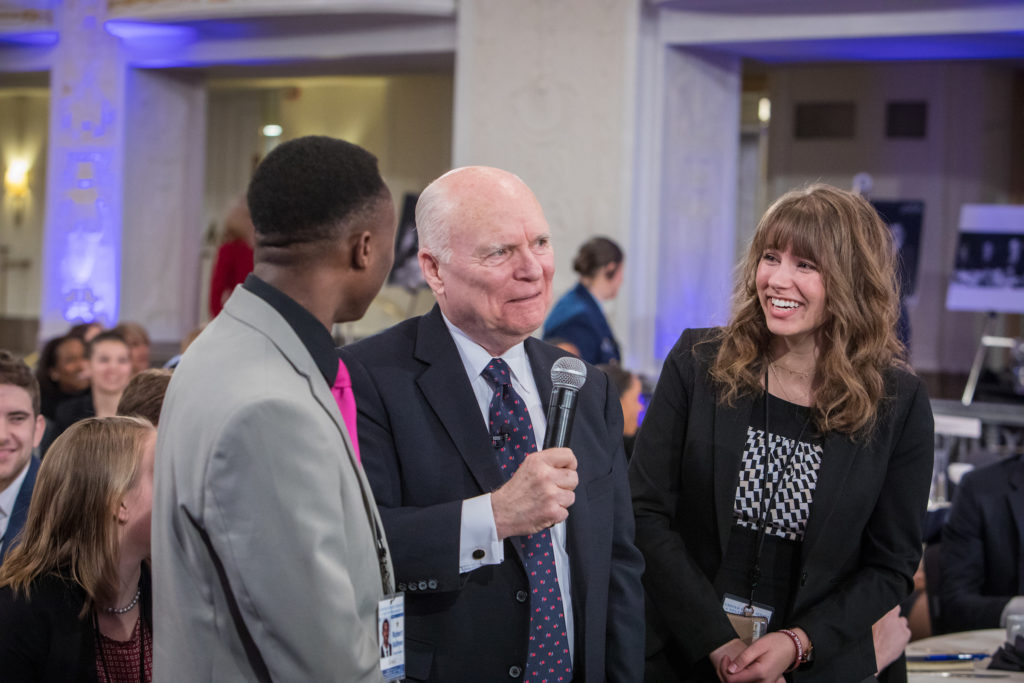
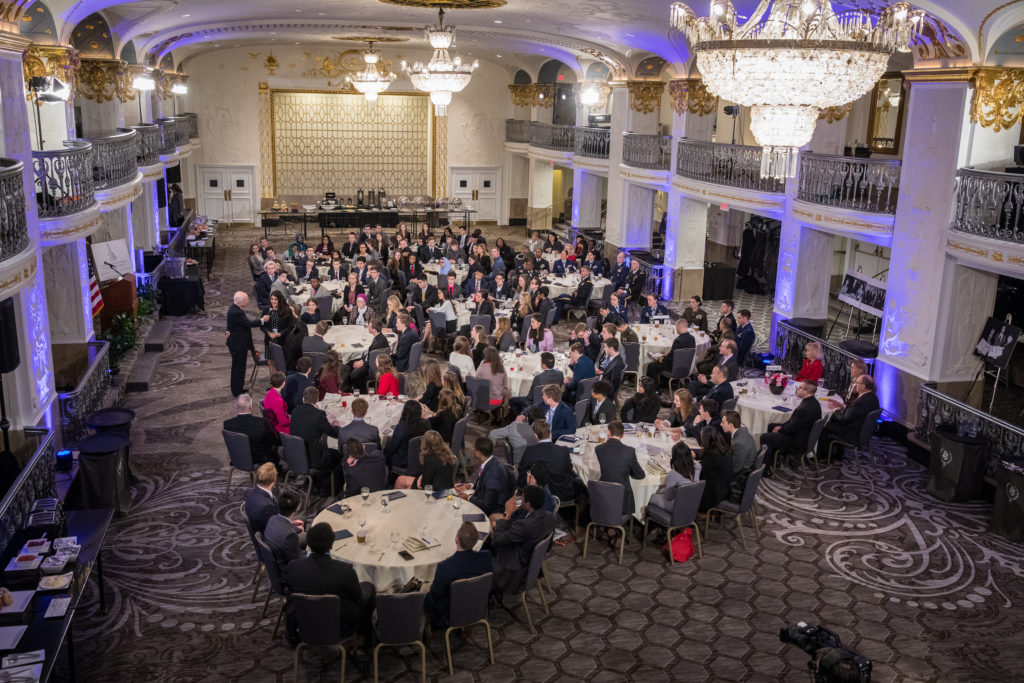
Brian Lamb interviewing students for “Q&A” on C-SPAN.
© Photos by Jakub Mosur and Erin Lubin
